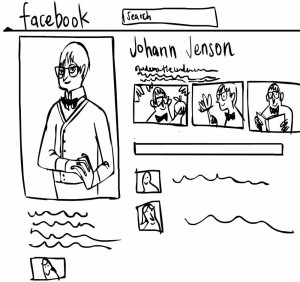Online profiles deserve privacy
Hide your beers and hide your bongs — your future bosses are climbing into your Facebook accounts, snatching your pictures up.
According to a survey by Vault, a recruiting website, three out of every four employers use Facebook in the hiring process. Conscientious job applicants know employers check digital trails. Few USC students need to be told to make sure pictures of last weekend’s party aren’t accessible to strangers.
This is not to say we should pay more attention to our online profiles; when it comes to our job prospects, we shouldn’t have to do so in the first place.
Though it is in the interest of employers to know their applicants well, an online profile is almost never an accurate portrayal of an applicant’s abilities in the workplace. The practice of looking at applicant profiles is unethical: It erodes the wall between office life and private life.
Before the digital age, office life and private life were easier to define. Office life happened — believe it or not — in the office. It is true the lines were never completely solid: the more responsibility an employee had, the more he or she needed to maintain a clean public image. Nevertheless, one’s habits, hobbies and personal views were not as accessible as they are in this particular decade.
Today employers can read, hear, watch and even save their conversations.
But the ease of monitoring applicants does not make it right or useful.
The idea that people’s qualifications can be judged accurately by their social media profiles is only partially correct. Even though many older adults use websites like Facebook and Twitter for networking, among teens and 20-somethings, social media websites have a truly social function.
Thus, especially among college students, Facebook often misrepresents priorities. Many students choose to highlight how fun they are over how smart or dependable they are. A winner of multiple math awards might emphasize pictures of herself dancing wildly at a concert. A student known for being thoughtful and balanced in the classroom might be politically incorrect in his status updates.
Research has shown people portray certain parts of themselves accurately on Facebook, even when they think they’re showing idealized versions of themselves. A study at Tufts University found people’s levels of extroversion and openness shine through on Facebook. Another study reported by Time magazine confirms the results: The study found that extraversion and openness, along with agreeableness, conscientiousness and neuroticism, show through in people’s profiles.
Still, neither study says anything about more specific traits that relate to the workplace — traits like dependability, teamwork and emotional maturity.
There’s nothing wrong with emphasizing different parts of one’s personality in various places. As long as a person works hard and maintains reasonable respect for the law, there’s no reason to write him or her off for not being a saint.
Why, then, must companies continue to pretend that our private lives are so important in the workplace? Monitoring politicians and activists is one thing, but looking into the private lives of potential accountants and assistants is uncalled for.
There is an even more sinister side to Facebook monitoring. It makes covert discrimination easier.
Imagine two applicants who want to work for a company with a conservative corporate culture. Both applicants are equally polished and qualified, but one applicant is a fan of “Support Gay Adoption” on Facebook. The other lists Mitt Romney as his biggest inspiration. Ask yourselves who will get the job and ask yourselves if that’s fair.
Though applicants have the power to protect themselves against social media monitoring, unexpected privacy changes shouldn’t threaten people’s livelihoods. If a company really needs its applicants’ personal information, it should stop sneaking around and gather it up front.
Maya Itah is a senior majoring in communication. Her column “From Behind the Screen” runs Thursdays.


“The practice of looking at applicant profiles is unethical: It erodes the wall between office life and private life.” Just about sums it up…. agreed for sure.